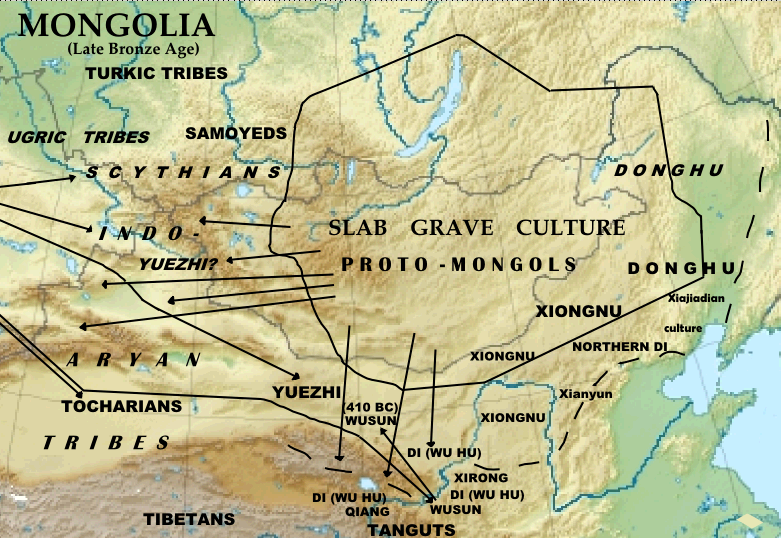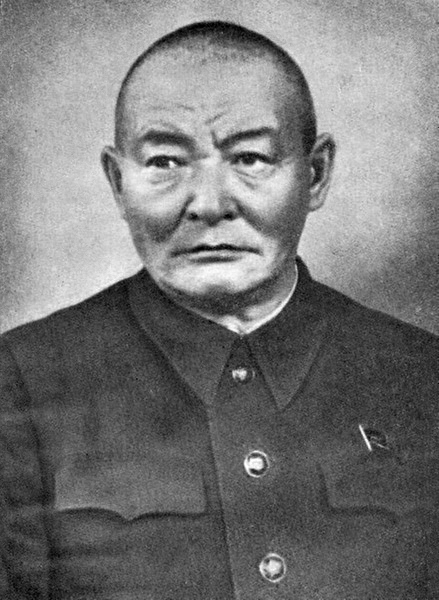|
Jamtsangiin Damdinsüren
Jantsangiin Damdinsüren () (1898–1938) was a Mongolian politician, member of the Mongolian People's Revolutionary Party (MPRP) and titular head of state of Mongolia from the period of January 16, 1927 to January 23, 1929. Biography Damdinsüren was born in Sain Noyon Khan Aimag (present day Zavkhan Province). As a young child he studied Tibetan language and classical Mongolian script. At age 16 he became a clerk in the local government. In 1923 he was appointed chief of staff of the new rural district in present-day Uliastai. In 1925 he was elected as a delegate to the Fourth Congress of the Mongolian Revolutionary Youth League (MRYL). At this congress Damdinsuren was elected a member of the Presidium and head of the Central Committee of the MYRL. At the MPRP Fifth Congress he was elected member of the Great Hural which in turn elected him a member of the Small Khural. At the Sixth Party Congress in early 1927 he was re-elected Chairman of the MRYL and a member of the ... [...More Info...] [...Related Items...] OR: [Wikipedia] [Google] [Baidu] |
Soyombo Yellow
The name Soyombo is derived from the Sanskrit word ''Svayambhu'' (meaning "created out of itself"). Soyombo may refer to: * Soyombo alphabet, an abugida developed by Zanabazar in 1686 to write Mongolian * Soyombo symbol, a special character of that script and national symbol of Mongolia * Soyombo movie theater, a movie theater/cinema of Mongolia * Soyombo (Unicode block), range of characters defined in the Unicode Standard for the Soyombo script {{disambig ... [...More Info...] [...Related Items...] OR: [Wikipedia] [Google] [Baidu] |
President Of Mongolia
The president of Mongolia is the executive head of state of Mongolia.Montsame NW Agency. ''Mongolina''. 2006, , p. 42 The current president is Ukhnaagiin Khürelsükh. Political parties with representation in the State Great Khural nominate candidates. The president was originally limited to two four-year terms, but this was changed to a non-renewable six-year term starting with the 2021 presidential election. The president can be removed from office if two-thirds of the Khural find them guilty of abusing their powers or violating their oath.Montsame News Agency. ''Mongolia''. 2006, , p. 43 Before inauguration, however, the president-elect must suspend their membership of any political party. Powers of the president *Nominating a candidate for the office of Prime Minister, who is then approved or rejected by the State Great Khural (parliament). This is a ceremonial responsibility, as the Khural will most likely reject any nominee who is not its own choice – in effect, ... [...More Info...] [...Related Items...] OR: [Wikipedia] [Google] [Baidu] |
Executed Mongolian People
Capital punishment, also known as the death penalty and formerly called judicial homicide, is the state-sanctioned killing of a person as punishment for actual or supposed misconduct. The sentence (law), sentence ordering that an offender be punished in such a manner is called a death sentence, and the act of carrying out the sentence is an execution. A prisoner who has been sentenced to death and awaits execution is ''condemned'' and is commonly referred to as being "on death row". Etymologically, the term ''capital'' (, derived via the Latin ' from ', "head") refers to execution by Decapitation, beheading, but executions are carried out by List of methods of capital punishment, many methods, including hanging, Execution by shooting, shooting, lethal injection, stoning, Electric chair, electrocution, and Gas chamber, gassing. Crimes that are punishable by death are known as ''capital crimes'', ''capital offences'', or ''capital felonies'', and vary depending on the jurisdic ... [...More Info...] [...Related Items...] OR: [Wikipedia] [Google] [Baidu] |
People From Zavkhan Province
The term "the people" refers to the public or common mass of people of a polity. As such it is a concept of human rights law, international law as well as constitutional law, particularly used for claims of popular sovereignty. In contrast, a people is any plurality of persons considered as a whole. Used in politics and law, the term "a people" refers to the collective or community of an ethnic group or nation. Concepts Legal Chapter One, Article One of the Charter of the United Nations states that "peoples" have the right to self-determination. Though the mere status as peoples and the right to self-determination, as for example in the case of Indigenous peoples (''peoples'', as in all groups of indigenous people, not merely all indigenous persons as in ''indigenous people''), does not automatically provide for independent sovereignty and therefore secession. Indeed, judge Ivor Jennings identified the inherent problems in the right of "peoples" to self-determination, as i ... [...More Info...] [...Related Items...] OR: [Wikipedia] [Google] [Baidu] |
Communism In Mongolia
Various nomadic empires, including the Xiongnu (3rd century BC–1st century AD), the Xianbei state ( AD 93–234), the Rouran Khaganate (330–555), the First (552–603) and Second Turkic Khaganates (682–744) and others, ruled the area of present-day Mongolia. The Khitan people, who used a para-Mongolic language, founded an empire known as the Liao dynasty (916–1125), and ruled Mongolia and portions of North China, northern Korea, and the present-day Russian Far East. In 1206, Genghis Khan was able to unite the Mongol tribes, forging them into a fighting force which went on to establish the largest contiguous empire in world history, the Mongol Empire (1206–1368). After the fragmentation of the Mongol Empire, Mongolia came to be ruled by the Yuan dynasty (1271–1368) based in Khanbaliq (modern Beijing) and administered as part of the Lingbei Province. Buddhism in Mongolia began with the Yuan emperors' conversion to and dissemination of Tibetan Buddhism. After colla ... [...More Info...] [...Related Items...] OR: [Wikipedia] [Google] [Baidu] |
Heads Of State Of Mongolia
A head is the part of an organism which usually includes the ears, brain, forehead, cheeks, chin, eyes, nose, and mouth, each of which aid in various sensory functions such as visual perception, sight, hearing, olfaction, smell, and taste. Some very simple animals may not have a head, but many bilateria, bilaterally symmetric forms do, regardless of size. Heads develop in animals by an evolutionary trend known as cephalization. In bilaterally symmetrical animals, nervous tissue concentrate at the anterior region, forming structures responsible for information processing. Through biological evolution, sense organs and feeding structures also concentrate into the anterior region; these collectively form the head. Human head The human head is an anatomical unit that consists of the Human skull , skull, hyoid bone and cervical vertebrae. The skull consists of the brain case which encloses the cranial cavity, and the facial skeleton, which includes the mandible. There are ei ... [...More Info...] [...Related Items...] OR: [Wikipedia] [Google] [Baidu] |
Mongolian Communists
Mongolian may refer to: * Something of, from, or related to Mongolia, a country in Asia * Mongolian people, or Mongols * Bogd Khanate of Mongolia, the government of Mongolia, 1911–1919 and 1921–1924 * Mongolian language * Mongolian alphabet * Mongolian (Unicode block) * Mongolian cuisine * Mongolian culture Other uses * Mongolian idiocy, now more commonly referred to as Down syndrome See also * * Languages of Mongolia * List of Mongolians * Mongolian nationalism (other) Mongolian nationalism may refer to: * Historical Mongolian nationalism that led to the Mongolian Revolution of 1911 against the Qing Empire * Historical Mongolian nationalism that led to the Mongolian Revolution of 1921 The Mongolian Revolutio ... * Mongolian race (other) * Mongoloid (other) {{disambiguation Language and nationality disambiguation pages ... [...More Info...] [...Related Items...] OR: [Wikipedia] [Google] [Baidu] |
Chairmen Of The State Great Khural
The Chairman of the State Great Khural () is the presiding officer of the State Great Khural The State Great Khural is the unicameral parliament of Mongolia,Montsame News Agency. ''Mongolia''. 2006, Foreign Service office of Montsame News Agency, , p. 40 located in the Government Palace in the capital Ulaanbaatar. History 191 .... List of chairmen References {{Chairmen of the State Great Khural 1990 establishments in Mongolia State Great Khural ... [...More Info...] [...Related Items...] OR: [Wikipedia] [Google] [Baidu] |
Mongolian People's Party Politicians
Mongolian may refer to: * Something of, from, or related to Mongolia, a country in Asia * Mongolian people, or Mongols * Bogd Khanate of Mongolia, the government of Mongolia, 1911–1919 and 1921–1924 * Mongolian language Mongolian is the Prestige (sociolinguistics), principal language of the Mongolic languages, Mongolic language family that originated in the Mongolian Plateau. It is spoken by ethnic Mongols and other closely related Mongolic peoples who are nati ... * Mongolian alphabet * Mongolian (Unicode block) * Mongolian cuisine * Mongolian culture Other uses * Mongolian idiocy, now more commonly referred to as Down syndrome See also * * Languages of Mongolia * List of Mongolians * Mongolian nationalism (other) * Mongolian race (other) * Mongoloid (other) {{disambiguation Language and nationality disambiguation pages ... [...More Info...] [...Related Items...] OR: [Wikipedia] [Google] [Baidu] |
1938 Deaths
Events January * January 1 – state-owned enterprise, State-owned railway networks are created by merger, in France (SNCF) and the Netherlands (Nederlandse Spoorwegen – NS). * January 20 – King Farouk of Egypt marries Safinaz Zulficar, who becomes Farida of Egypt, Queen Farida, in Cairo. * January 27 – The Honeymoon Bridge (Niagara Falls), Honeymoon Bridge at Niagara Falls, New York, collapses as a result of an ice jam. February * February 4 ** Adolf Hitler abolishes the War Ministry and creates the Oberkommando der Wehrmacht (High Command of the Armed Forces), giving him direct control of the German military. In addition, he dismisses political and military leaders considered unsympathetic to his philosophy or policies. General Werner von Fritsch is forced to resign as Commander of Chief of the German Army following accusations of homosexuality, and replaced by General Walther von Brauchitsch. Foreign Minister Baron Konstantin von Neurath is dismi ... [...More Info...] [...Related Items...] OR: [Wikipedia] [Google] [Baidu] |
1898 Births
Events January * January 1 – New York City annexes land from surrounding counties, creating the City of Greater New York as the world's second largest. The city is geographically divided into five boroughs: Manhattan, Brooklyn, Queens, The Bronx and Staten Island. * January 13 – Novelist Émile Zola's open letter to the President of the French Republic on the Dreyfus affair, , is published on the front page of the Paris daily newspaper , accusing the government of wrongfully imprisoning Alfred Dreyfus and of antisemitism. February * February 12 – The automobile belonging to Henry Lindfield of Brighton rolls out of control down a hill in Purley, London, England, and hits a tree; thus he becomes the world's first fatality from an automobile accident on a public highway. * February 15 – Spanish–American War: The explodes and sinks in Havana Harbor, Cuba, for reasons never fully established, killing 266 men. The event precipitates the United States' ... [...More Info...] [...Related Items...] OR: [Wikipedia] [Google] [Baidu] |
Stalinist Repressions In Mongolia
The Stalinist repressions in Mongolia () was an 18-month period of heightened political violence and persecution in the Mongolian People's Republic between 1937 and 1939. The repressions were an extension of the Stalinist purges (also known as the Great Purge) unfolding across the Soviet Union around the same time. Soviet NKVD advisors, under the nominal direction of Mongolia's ''de facto'' leader Khorloogiin Choibalsan, persecuted thousands of individuals and organizations perceived as threats to the Mongolian Revolution of 1921, Mongolian revolution and the growing Soviet influence in the country. As in the Soviet Union, methods of repression included torture, show trials, executions, and imprisonment in remote forced labor camps, often in Soviet Gulag, gulags. Estimates differ, but anywhere between 20,000 and 35,000 "enemies of the revolution" were executed, a figure representing three to five percent of Mongolia's total population at the time. Victims included those accused ... [...More Info...] [...Related Items...] OR: [Wikipedia] [Google] [Baidu] |





